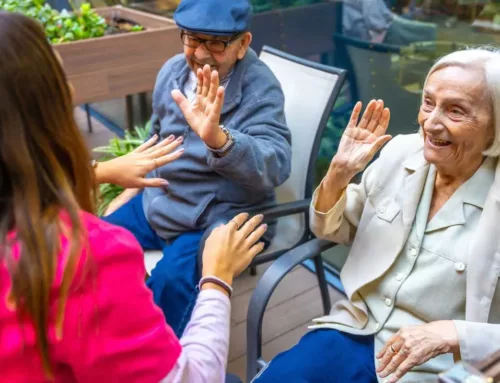
Providing care can take a significant toll on family caregivers, but the effects of caregiving on the caregiver often go unnoticed. Unlike professional caregivers in residential assisted living or healthcare settings, family caregivers are in the unique position of caring for an aging senior they know and love – oftentimes a parent or relative who once looked after them.
In these circumstances, it can be tempting to push aside your own needs for those of the person you care for, and as result, burnout is extremely common amongst family caregivers. What’s more, family caregivers often have no formal training and may lack access to accessibility aids and adapted facilities. This can make caregiving even more mentally and physically tough. If an aging senior often experiences distress, caregivers may also develop compassion fatigue.
Family caregivers are also often at a greater risk of physical ill health and injuries due to the demands of caregiving, which is typically time consuming when combined with other lifestyle commitments like childcare and employment. For example, things like sleep deprivation, poor eating and exercise habits, and continuing to work or cancelling medical appointments when sick can lead to poor overall wellbeing.
If you are in a family caregiver role, paying attention to your own needs is vitally important. You deserve to feel healthy, and staying fit and well will undoubtedly improve the care you’re able to provide for your parent or loved one. Though it can be difficult to find time for self-care in the busy lifestyle of a family caregiver, there are a few simple things you can do to stay mentally and physically healthy.
1. Consider How You Can Manage Your Stress.
When combined with other worries and responsibilities, the demands of providing care are often a significant cause of stress for family caregivers. Sometimes, this stress may feel overwhelming, and if left unattended for a long period of time, stress can significantly affect overall health. Managing stress is highly personal and will look different for everyone, but it’s important to consider what will help you. Some family caregivers might find taking up stress-reduction strategies like meditation or yoga helpful, whereas others may benefit from more practical solutions, like delegating tasks to other family members from time to time. The important thing is to find something that works for you and that fits with both your lifestyle and the time you have available.
2. Take Some Outdoor Exercise and eat Healthily.
Caregiving can be a full-time job, and finding time to exercise might seem like an unattainable goal. However, just a small period of movement each day can make a difference. Even if it’s a brisk walk around the block each morning, prioritizing some sort of exercise may be greatly beneficial to your health, wellbeing and stress levels. Similarly, eating healthily needn’t mean spending hours preparing complicated meals or breaking the bank buying obscure ingredients. Big changes can come from small adjustments, like simply striving to incorporate more fruits and vegetables into your daily diet, or cutting down on processed foods and takeout a little. The benefits of healthy eating are aplenty, from increased energy and mood right through to strengthened immune functioning and physical fitness.
3. Prioritize Rest and Sleep.
Finding the time to relax and sleep can be tough for family caregivers. Whether it’s the logistics of finding time to sleep when providing 24-hour care, or lying awake worrying about your loved one, you may face a whole host of barriers that prevent you from getting the high quality shut-eye you need and deserve. Sleep is an absolutely vital but often underestimated tool for improving health. While it might not be possible to get an uninterrupted 8 hours every night, there are small things you can try to help yourself drift off. For example, switch off electronic devices 30 minutes to 1 hour before bed to avoid sleep-disrupting blue light. Creating a bedtime routine that works for you may also be beneficial – this could include things like reading a book, taking a bath, stretching or journaling.
4. Don’t Neglect Your Own Medical Needs.
When you have to support the healthcare needs of an aging loved one each day, it can be easy to start neglecting your own health. But for the sake of both yourself and the aging senior you care for, looking after your medical needs should be high on your list of priorities. After all, without your own health you will be much less capable of providing quality care. Be sure to attend appointments, and try to resist the temptation to put off routine check-ups – prevention is always better than cure.
5. Learn to Accept Support.
Many family caregivers take the weight of the world on their shoulders, having a fiercely independent nature that can sometimes prevent them from reaching out for or accepting support. Think about whether you could use any practical, social or emotional support, and don’t be afraid to ask. Reach out to a friend and grab a coffee, ask a family member to help with your loved one’s care or seek out expert support if your relative’s needs are becoming too difficult to cope with alone. Seeking and accepting help when you need it is a great sign of strength.
Moving Forward to Residential Assisted Living
There may come a point when you’re no longer able to meet your senior loved one’s needs while also taking care of yourself properly. At this stage, it might be time to raise the possibility of a move to residential assisted living in Tucson with your loved one. If you feel specialist residential assisted living care like Saguaro Ranch Assisted Living, might be the next step forward for your relative, get in touch today. We’re always happy to answer any questions or arrange a personalized tour to help you and your loved one get a flavor of life in residential assisted living.




